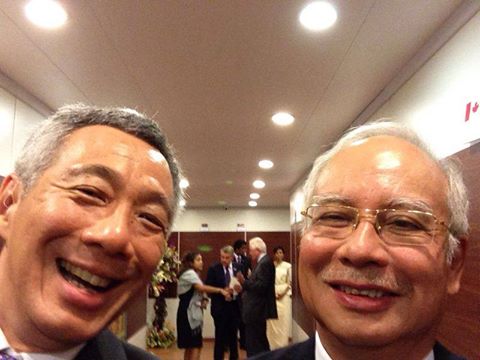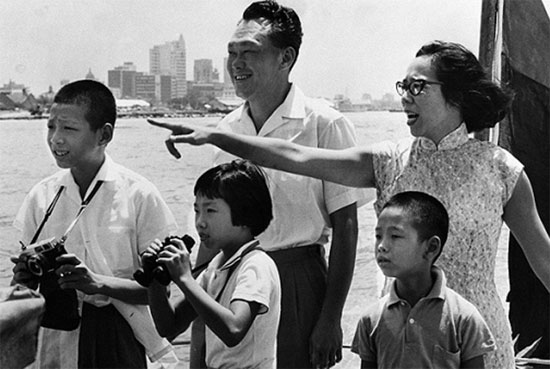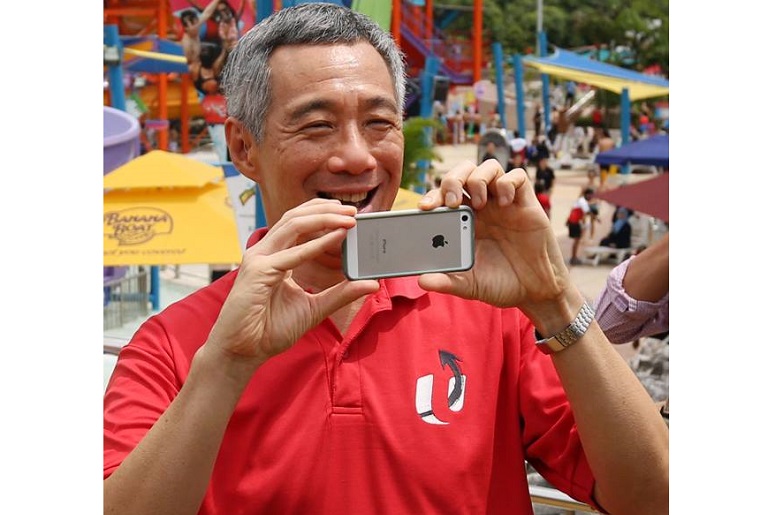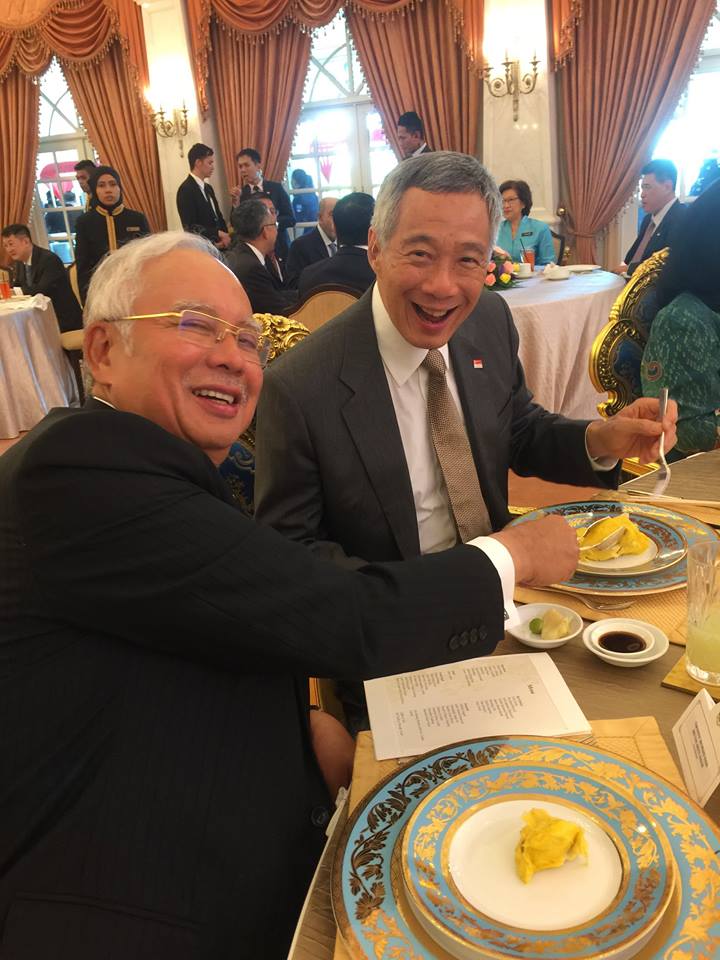On Wednesday, Malaysian news agency Bernama published an interview it did with Prime Minister Lee Hsien Loong on Monday at the Istana.
This one is different from his previous interviews with the Financial Times, Wall Street Journal, and TIME magazine.
In those interviews, PM Lee takes the role of an international relations professor who is able to explain in a coherent and succinct manner what the shifts of great power relations mean for non-practitioners.
As our Malaysian counterparts know us much better, one is able to get a different flavour of PM's views on things closer to home.
Here are the highlights from its transcript, that was published on Wednesday (Nov 30) in summary:
1. PM Lee swaps notes with Malaysia PM Najib on what it's like to be sons of past PMs
 Photo from PM Lee's Facebook page. We're glad his selfie and photo-taking skills have improved markedly since.
Photo from PM Lee's Facebook page. We're glad his selfie and photo-taking skills have improved markedly since.
As we would know, PM Lee is the son of the late founding PM Lee Kuan Yew.
Malaysian PM Najib Razak is the son of Malaysia's second PM Abdul Razak Hussein, who was in office between 1970 and 1976.
Asked about the unique commonality PM Lee and PM Najib share, PM Lee said:
"It is a positive factor because it means that both of us have had environments where we have been focused on this bilateral relationship of Singapore and Malaysia for a very large part of our lives. We know how important it is and we would like to make it better, which I think we are not doing badly."
He added this has been helpful in their relationship and he hopes to do more with Malaysia, armed with his "very good relationship" with Najib.
That said, he also bravely touched on the tensions between us:
"Our two countries have a very close relationship and yet, we are very different. Our societies are different -- values, cultures and the way we look at the world. It is not a criticism on either side but it is the way things are. So while we have to work closely together, we must realise that we are not the same as each other. That is why we became two countries.
To improve the relationship, we have to understand each other better, have more intimate interactions to appreciate each other's perspectives on our relationship as well as on the world. We also have to respect and be able to cooperate despite the contrast. This is very important at the leaders' level, at ministers' and officials' level, and also at the peoples' level. The more we see one another and the more we work together on win-win cooperation, the better prospects for friendship and for harmonious relations."
2. Lee Kuan Yew prepared "very consciously" for the day Singapore would have to continue without him.

PM Lee was asked about how his family and Singapore is coping without his late father.
"Mr Lee prepared well for the day when Singapore would have to continue without him. In terms of preparing for the succession and gradually fading away from the public limelight, it was a process which he did very consciously over many years.
When he passed away, we all grieved greatly but at the same time we were prepared. Singapore carried on. We maintained our confidence, strengthened our sense of cohesion, and a year later, we marked the first anniversary this year of his passing on 23rd March. The sadness is still there, but life has had to go on. We strengthened ourselves, remembering his memory and what his teachings were. That is the way forward for Singapore. Similarly, for the family, you have to go through a process of grief and acceptance, but my father lived a full life."
3. PM Lee explains air-gapping computers in layman terms
 Photo from PM Lee's Facebook page
Photo from PM Lee's Facebook page
As you might already know, PM Lee is quite the IT-savvy person — not only is he a mathematician by training, he also does coding and mostly solves his own IT problems, even while travelling.
He also took the lead in using air-gapped computers for government work, and explains the rather controversial move they took to applying this public-service-wide:
"It is a basic precaution we have to take, because we do all our business on the network - our emails within the Government, as well as our interactions with the public.
When it comes to web browsing and surfing, if we use the same system as your emails and as your internal network, we are very vulnerable. Because whatever anti-virus software and firewalls we put in, there is always the possibility that something will slip through. So I see a tempting line or a photograph and you click it, I compromise not just my own computer but the whole network.
Having struggled with this problem for quite a long time, like other organisations, we finally decided that the only way forward is to separate the two. Emails in one system, but if you want to surf the Internet, please use a separate computer. You can use your tablet, you can use your smartphone, or if it is essential for your job, the government may give you a separate computer and you put the two side by side. It is a more secure way of operating, keeping our system clean.
We can operate efficiently. I have been doing this since the beginning of the year. It is a nuisance but it is workable."
4. Here's how he explains the government's decision to enact the hiatus-triggered model for the Elected Presidency, and why the next election will be reserved for Malays:
"In a national vote in a multiracial society, it is harder for a minority candidate to win than for a Chinese candidate to win.
We have had one minority President, he served two terms, Mr S R Nathan, since we introduced the scheme of the elected President. But we worry over the long term that without a system to ensure that a minority becomes the President from time to time, then it is going to be difficult and we will have long periods where we do not have a minority as a President.
So we decided that we will make such a system, put it into the Constitution, that if after five terms we do not have a President from a particular minority community - that means either no Malay President or no Indian or other minority President - then in the next term, the election will be reserved for candidates from that community.
In our case, we have had five terms without a Malay elected President. In fact, if you look at the presidents before that, before the present system, it is 45 years since Yusof Ishak. Therefore, the next election will be reserved for a Malay candidate.
I do not know how many will come (forward to stand for election). There is no shortlist because it depends on who offers themselves."
5. And his answer to the question that follows — what about a minority Prime Minister?
"It could happen in our lifetime. If you look at America, Barack Obama became president. In their case, it took 200-something years, or 100-something years if you count from the time of the Civil War. It is a long process but it is possible and I hope one day it will happen.
The racial patterns of voting is something very deeply ingrained. It is so in Malaysia; it is so in Singapore, perhaps less so in Singapore but it exists. If you look at America, even in this election, it was quite clear that the different ethnic groups had very different voting patterns. So that is a reality of human nature which we have to accept."
As well as a little poke on succession and who's next in line:
"I have a team of younger Ministers. I brought some of them in in 2011, some more last year in 2015. They are all working hard, doing well. I hope that soon after the next election, amongst them they will have decided, settled and the leader will be ready to take over from me."
Top photo from PM Lee's Facebook page.
If you like what you read, follow us on Facebook and Twitter to get the latest updates.
If you like what you read, follow us on Facebook, Instagram, Twitter and Telegram to get the latest updates.
